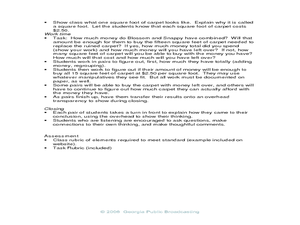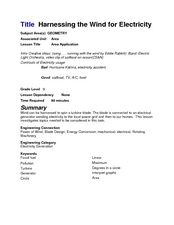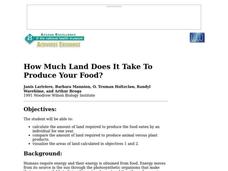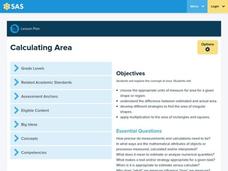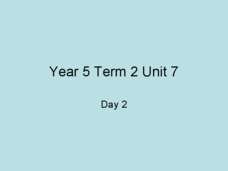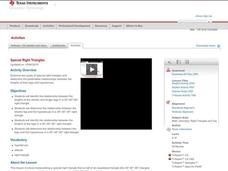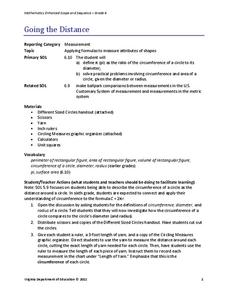Curated OER
Creating Gardens
Students are shown that numeracy is all around them. They use volume, and calculate the quantity of soil required to make a garden to given instructions. Students are asked how to calculate the amount of soil required for the garden.
Curated OER
Carpet
Students complete activities for geometric shapes and multiplication. In this multiplication lesson, students watch a video about carpets and square foot multiplication problems. Students then work in pairs to solve the main problem in...
Curated OER
Tangram Perimeters
Students work together to make figures out of tangram squares. In groups, they calculate the measurements they need and apply the Pythagorean Theorem. They complete a worksheet solving equations using the theorem and review their answers.
Curated OER
Harnessing the Wind for Electricity
Ninth graders explain how wind can produce electricity. For this geometry lesson, 9th graders construct their own pin wheel turbine and calculate its power. They discuss the pros and cons of using wind generator.
Curated OER
Scenes of the Earth
Students examine and study how changes in perspective can change the way that they can observe objects. They explore the relationship between a scene's area and its detail. Each student looks at the ground through cardboard tubes from...
Curated OER
Percentages: Converting Fractions and Decimals to Percents
Students calculate percentages. In this percentages lesson, students count the total number of floor tiles covering a given space, measure a designated section of the room, and then calculate the percentage of the room this area covers.
Curated OER
How Much Land Does It Take To Produce Your Food?
Students calculate the amount of land required to produce the food eaten by an individual for one year and compare the amount of land required to produce animal versus plant products. They use calorie counting resources to compile the...
Curated OER
Chances Are: Talking Probability
Students explore probability and the process of data analysis and predictions. They participate in two activities, one involving a calculator and one the Internet, in which they make predictions and conduct activities to test their...
Curated OER
Using the Pythagorean Theorem
Students apply the Pythagorean Theorem to solve real-world problems. They draw diagrams based on written descriptions to calculate the examples.
Curated OER
Lift/Velocity Relationship Problem Set
Students, after reading an explanation from a NASA Web-based textbook, demonstrate their ability to use, graph (using a graphing calculator), and interpret a text equation.
Curated OER
Every Breath You Take
Pupils explore the nature of the air we breathe by observing petri dishes that have accumulated particulate matter from the atmosphere. Students make mathematical calculations and inferences about the effect of this matter on breathing....
Curated OER
Pythagorean Theorem by Graphic Manipulation
There are many different ways to show a proof of the Pythagorean Theorem. Here is a nice hands-on paper cutting activity that shows a graphic representation. You can even challenge your young Pythagoreans to come up with their own...
Pennsylvania Department of Education
Multiplication Using Arrays
Explore the concept of multiplication by using arrays. Classmates use arrays to gain a better understanding of multiplication. They break arrays apart to model the distributive property of multiplication over addition. The relationship...
Curated OER
Tiling Tessellations
Students explore tessellations. In this shapes and geometry instructional activity, students describe the attributes of many of the shapes displayed on an Elmo. Students create examples of tessellations using pattern blocks.
Curated OER
Year 5, Term 2, Unit 7
Here is a challenging presentation which should be tough for even your top math learners. In it, pupils view 86 slides which take them through many mathematical concepts such as doubling, halving, decimals, word problems, and converting...
Mathematics Vision Project
Module 5: Modeling with Geometry
Solids come in many shapes and sizes. Using geometry, scholars create two-dimensional cross-sections of various three-dimensional objects. They develop the lesson further by finding the volume of solids. The module then shifts to finding...
EngageNY
Complex Numbers and Transformations
Your learners combine their knowledge of real and imaginary numbers and matrices in an activity containing thirty lessons, two assessments (mid-module and end module), and their corresponding rubrics. Centered on complex numbers and...
Charleston School District
Review Unit 1: Exponents
What will be on the test? The resource provides comprehensive review items for the content of the unit on exponents. The resource divides the sections in the order you present the lessons during the unit.
Curated OER
Special Right Triangles
Using the Pythagorean Theorem to solve for missing angles, students evaluate right triangles and their properties.
Santa Barbara City College
How to Make a Multiplication Table
Teach children how to make a multiplication table, and they'll be multiplying for life. Following this series of steps, young mathematicians learn to use patterns and the relationships between numbers to create their very own...
University of Wisconsin
Identifying Your Soil for Rain Gardens
Teach your class the descriptive characteristics of soil. Provide information about particle size and a flow chart for assessing texture. Soil scientists then analyze samples and hypothesize which would be the best type for a rain...
EngageNY
Applications of the Pythagorean Theorem
Begin seeing the world through the lens of geometry! Use the 19th installment in a 25-part module to apply the Pythagorean Theorem to solve real-world problems. Individuals sketch situations resulting in right triangles such as the...
Creative Educator
Dream Room Design
Junior designers brainstorm the elements that a bedroom might have, such as a bed, television, and dresser. They identify which items are needs and which are desires. They practice measurement skills in the classroom by determining its...
Virginia Department of Education
Going the Distance
Estimate the value of one of the most famous irrational numbers. The hands-on activity instructs classmates to measure the circumference and diameters of circles using yarn. The ratio of these quantities defines pi.



